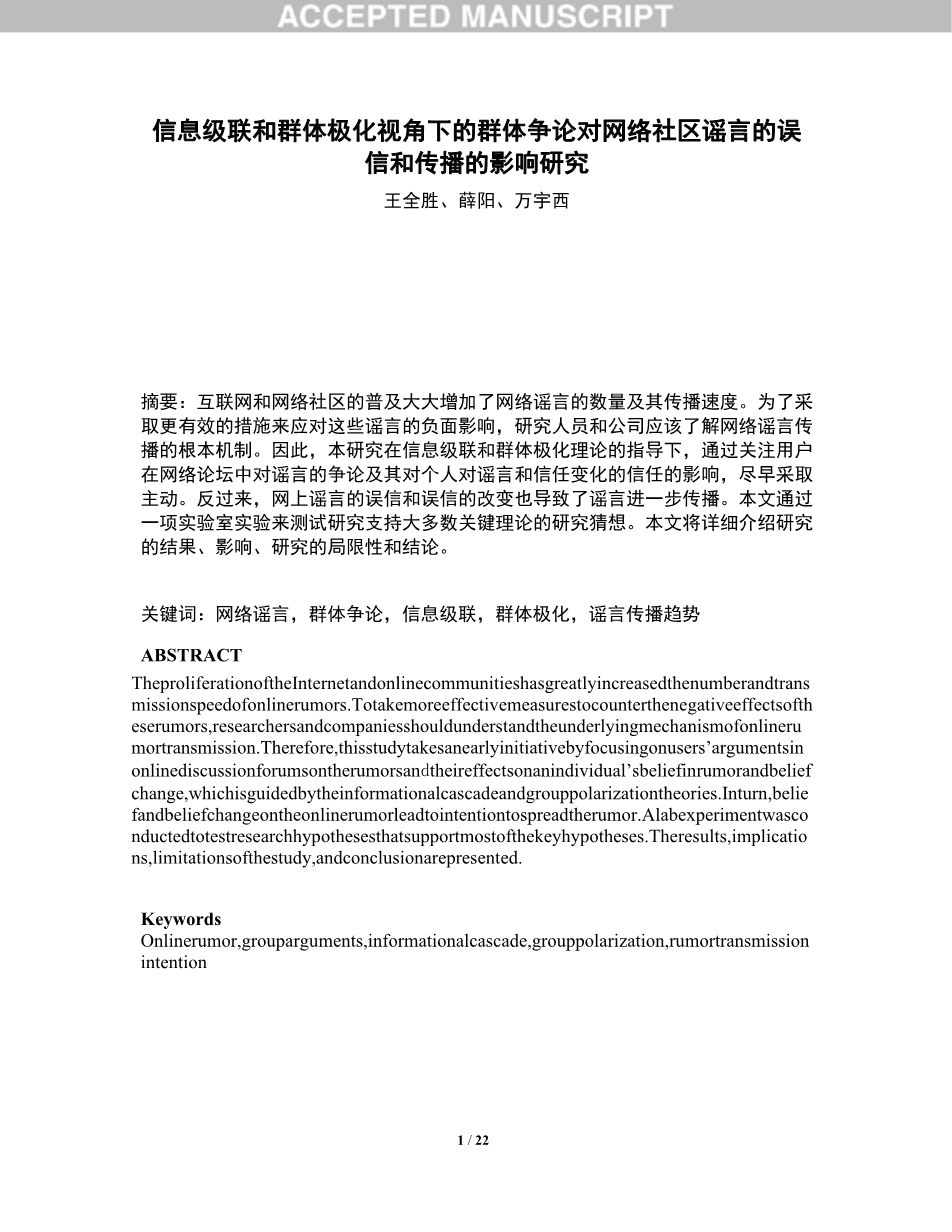Accepted Manuscript
Title: Effects of group arguments on rumor belief and transmission in online communities: An information cascade and group polarization perspective
Authors: Quansheng Wang, Xue Yang, Wanyu Xi PII: S0378-7206(17)30905-9
DOI: https://doi.org/10.1016/j.im.2017.10.004
Reference: INFMAN 3027
To appear in: INFMAN
Received date: 8-2-2016
Revised date: 3-10-2017
Accepted date: 15-10-2017
Please cite this article as: Quansheng Wang, Xue Yang, Wanyu Xi, Effects of group arguments on rumor belief and transmission in online communities: An information cascade and group polarization perspective, Information and Management https://doi.org/10.1016/j.im.2017.10.004
This is a PDF file of an unedited manuscript that has been accepted for publication. As a service to our customers we are providing this early version of the manuscript. The manuscript will undergo copyediting, typesetting, and review of the resulting proof before it is published in its final form. Please note that during the production process errors may be discovered which could affect the content, and all legal disclaimers that apply to the journal pertain.
Effects of Group Arguments on Rumor Belief and Transmission in Online Communities: An Information Cascade and Group Polarization Perspective
Quansheng Wanga, Xue Yangb, and Wanyu Xic
- Department of Marketing and Electronic Business, School of Business (Management), Nanjing University, Hankou Road 22, Nanjing, Jiangsu, China, 210093, wangqs@nju.edu.cn
- Department of Marketing and Electronic Business, School of Business (Management), Nanjing University, Hankou Road 22, Nanjing, Jiangsu, China, 210093, yangxue@nju.edu.cn(corresponding author)
- Department of Marketing and Electronic Business, School of Business (Management), Nanjing University, Hankou Road 22, Nanjing, Jiangsu, China, 210093, xiwanyu_nju@126.com
ABSTRACT
The proliferation of the Internet and online communities has greatly increased the number and transmission speed of online rumors. To take more effective measures to counter the negative effects of these rumors, researchers and companies should understand the underlying mechanism of online rumor transmission. Therefore, this study takes an early initiative by focusing on usersrsquo; arguments in online discussion forums on the rumors and their effects on an individualrsquo;s belief in rumor and belief change, which is guided by the informational cascade and group polarization theories. In turn, belief and belief change on the online rumor lead to intention to spread the rumor. A lab experiment was conducted to test research hypotheses, which support most of the key hypotheses. The results, implications, limitations of the study, and conclusion are presented.
Keywords
Online rumor, group arguments, informational cascade, group polarization, rumor transmission intention
ABSTRACT
The proliferation of the Internet and online communities has greatly increased the number and transmission speed of online rumors. To take more effective measures to counter the negative effects of these rumors, researchers and companies should understand the underlying mechanism of online rumor transmission. Therefore, this study takes an early initiative by focusing on usersrsquo; arguments in online discussion forums on the rumors and
their effects on an individualrsquo;s belief in rumor and belief change, which is guided by the informational cascade and group polarization theories. In turn, belief and belief change on the online rumor lead to intention to spread the rumor. A lab experiment was conducted to test research hypotheses that support most of the key hypotheses. The results, implications, limitations of the study, and conclusion are presented.
Keywords
Online rumor, group arguments, informational cascade, group polarization, rumor transmission intention
INTRODUCTION
The number of global online users hit a dramatic number of three billion1, and a large percentage of them have been frequently participating in various types of online communities, such as discussion forum or social media sites, to post and exchange their opinions or comments on particular issues, products, or organizations [1]. However, the anonymity and openness of the Internet provides users with opportunities to comment in an unrestricted way, which potentially can propagate numerous negative online rumors. For instance, there was rumor that KFC in China supplied mutated chicken to customers, which aroused anger among customers and made KFC sue the Chinese companies for spreading the rumor. Other famous companies such as Coca-Cola, Procter amp; Gamble, and Starbucks have constantly been the targets of online rumors about harmful ingredients in the products or misconducts of the company2. For luxury brands, an online rumor accusing Michael Kors of skinning dogs alive and transforming them into luxury handbags originated from an US petition website and later rapidly transmitted to the global market3. Online rumor can cause detrimental financial harms in some cases. The rumor of a start-up company LeEco was reported to be lying off more than 1,000 employees due to fast expansion and cash crunch4. After the rumor spread at famous social network sites, LeEcorsquo;s stock price immediately dropped by 9.9% per share. Hot debate about the recent rumors that some leading Chinese companies are moving their manufacturing facilities out of mainland China to other countries with lower costs also hurts the reputation of these companies and their executives that people criticize them to be unpatriotic.
Bey
剩余内容已隐藏,支付完成后下载完整资料


英语译文共 16 页,剩余内容已隐藏,支付完成后下载完整资料
资料编号:[258948],资料为PDF文档或Word文档,PDF文档可免费转换为Word


